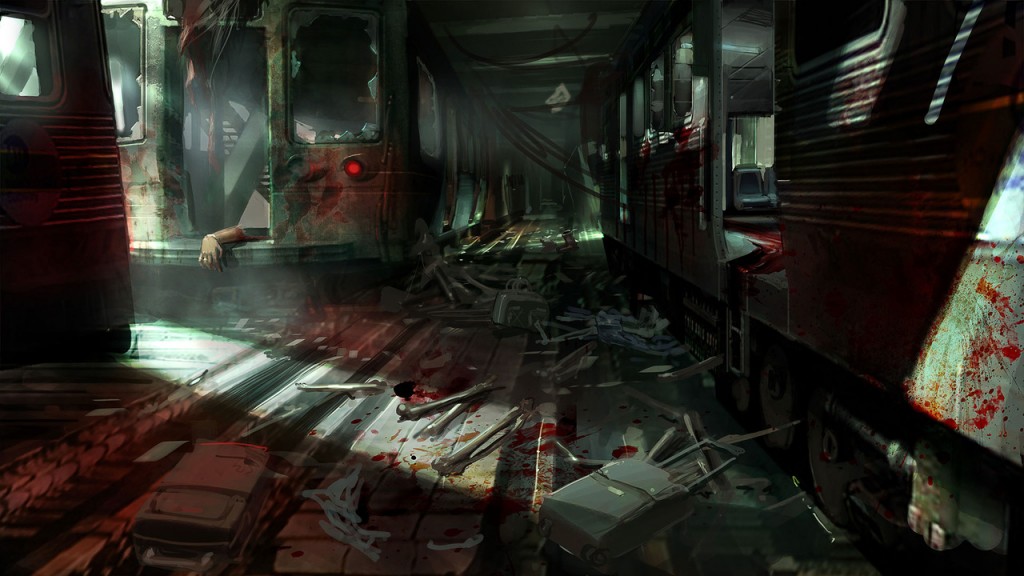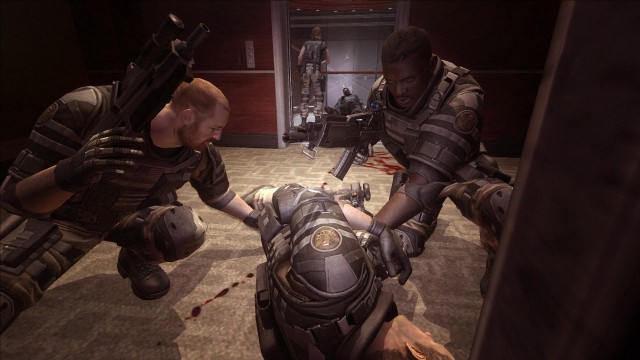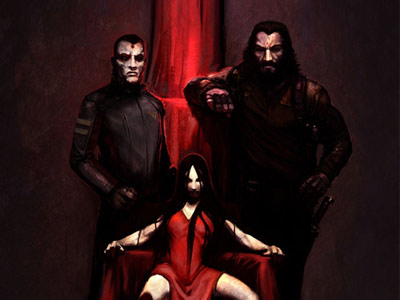Dear Reader,
Look, I’m not going to B.S. you here: I plan to ramble about “F.E.A.R. 3.” If you don’t want to keep reading I won’t hold it against you. But there’s just so much to talk about with these games, and now is the only time I have a valid excuse to do it. With F3 less than a week away, the time is ripe to sit down and consider where we’ve been so far, and where we’re going with these games. Hit the jump as I analyze the differences between “F.E.A.R.” and “F.E.A.R. 2,” and make some predictions about the upcoming threequel.
I hated “F.E.A.R. 2” for a long time. After following its development closely, right through the whole legal debacle involving its name, I felt personally closer to Monolith’s sequel than I had to any game in a long time. Never mind that I had wanted the title to be “F.E.A.R. 2: Dead Echo,” I was content with the choice the fans made (Monolith put it to a vote). When it finally came out, I played an hour of it and swore it off forever. I was furious, I had never felt so bait-and-switched by a game. The combat was too easy, the A.I. was moronic, and the tone had blown way over the top. It would be a long journey towards me eventually reconciling with the game, and the franchise as a whole.
Part of that journey was admitting that yes, the core elements were watered down. Anyone who’s played the original knows that the brain-dead monkeys you square off against in the sequel aren’t worthy to lick the boots of the first generation Replicas. To wit, “F.E.A.R. 2” is not frightening. The elements are all there, but somehow their capacity to get under your skin is muted. I’m not sure how or why this happened, but I don’t think it’s simply a case of growing accustomed to Alma. Something in the delivery went awry, something that didn’t have to be what it ultimately was. These twin blows made me swear off the entire franchise for over a year. Even the original didn’t feel as special to me anymore. It didn’t help that at the time “F.E.A.R. 2” was released, I was still struggling through the abysmal expansions.
And yet, with time I softened. Yes, the bitter, blood-in-your-mouth ferocity was gone, but I came to realize that it was replaced by something almost as good: a lush, vibrant tonal giddiness. The original “F.E.A.R.” is an austere experience, a brittle and merciless machine designed to wring sweat out of your pores. “F.E.A.R. 2,” on the other hand, is more like a joyride. Its principal aim is to envelop and seduce, to create a darkness that you want to wander into. The color palette is comparatively sumptuous, the world rendered in meatier textures and more showy lighting effects. And yes, it’s easier. But it’s fun, a breezy way to soak in the delicious atmosphere without the burden of fighting for every breath. It also helps that the story is better told, with a “had to see it to believe it,” jaw-dropping shocker of a closing cinematic.
Perhaps the disparity between these two titles, which initially made me hostile to “Project Origin,” actually makes sense. The original “F.E.A.R.” was Point Man’s journey into a self-revelation that he desperately did not want. His mother, Alma, was scolding him, yelling at him, demanding his attention, and the nature of the emotional experience was reflected in the unyielding timbre of the gameplay. “F.E.A.R. 2,” on the other hand, finds us playing as Michael Beckett, and Michael is not being punished by Alma, he’s being seduced. She chooses him out of the members of his team, and then advances upon him sexually, desperate to be impregnated again. In light of that, it makes sense that the game is more tantalizing.

It’s certainly more erotic. Alma in the original is mostly a prepubescent girl, but in “Project Origin” she’s a nude woman, standing upright and projecting her body in a more sexual manner. She repeatedly grabs Beckett by the wrists and brings her face close to his, even lingering there for a moment. The player could be forgiven for assuming this is just another attack, like the ones they endured in the last game, but the fundamental character of her behavior is altered. An NPC describes her as being able to “smell you,” and wanting to “consume you.” Certainly, these interactions are violent, but remember that violence is the only way Alma knows how to relate to anyone. To her, the attacks Beckett endures are little more than rough housing, and if he can’t take them, then he isn’t the man she wanted anyway.
So where will we find ourselves in “F.E.AR. 3,” given the schema we’ve just laid out? We’ve observed that in this franchise, gameplay is always determined by story, so let us look to the character of the narrative Day 1 is undertaking. While we obviously don’t know all the details right now, what we’ve seen strongly emphasizes the brotherly connection between Paxton and Point Man, and the familial ties that unite them both to Alma. Perhaps we can infer that F3 is thematically focused on family; that while the first two were solitary by nature, this latest entry is about togetherness. This would certainly fit with the inclusion of new co-op modes, and a more dedicated focus on multiplayer.
So if family and blood ties are our anchor for “F.E.A.R. 3,” will it fit in with the other two? I think so. By aiming to provide an experience unique to the franchise, Day 1 smartly positions itself to fight a battle it can actually win. It’s unlikely they could recapture the razor-wire terror of the original, and I full-on defy them to shock me more than “Project Origin’s” barn-burner climax did, but if they can provide a new yet logical progression in the series, then it won’t matter.
I’m amazed at how smart Day 1 has been so far: keeping the player count low, emphasizing co-op and unusual competitive game modes, and avoiding the temptation to ape “Call of Duty.” “F.E.A.R. 2′” had deathmatch, and it never felt like it belonged there. This, on the other hand, feels like a canonical interpretation of the “F.E.A.R.” ethos into a new game space. F3 will earn its seat at the table by asserting a multiplayer focus that the other two games can’t argue with, and in so doing will carve out its own identity and deepen the story and gameplay implications of the series as a whole.
Unless, of course, the game sucks.
–AA
i told everybody i was late, but i was hiding in the back




2 Comments
By your description… F.E.A.R. 2 = Vore?
Well, yes and no. From a psychological standpoint, certainly. But technically, Alma’s designs on you are pretty straightforward: she wants another baby, and you’re the guy who’s going to give her one.